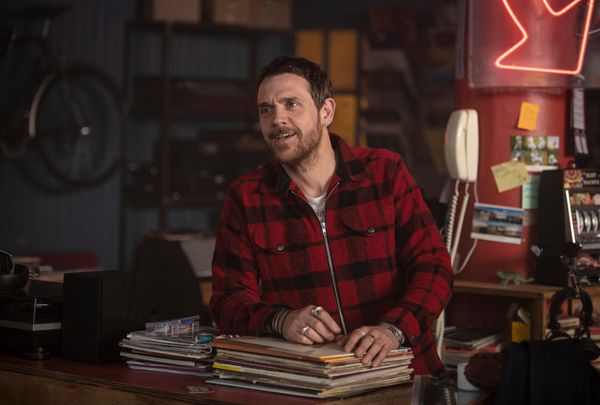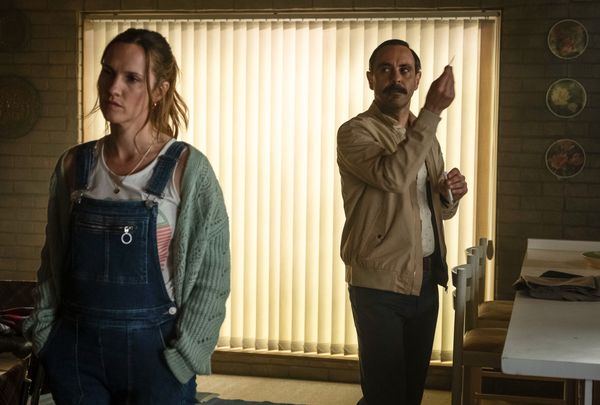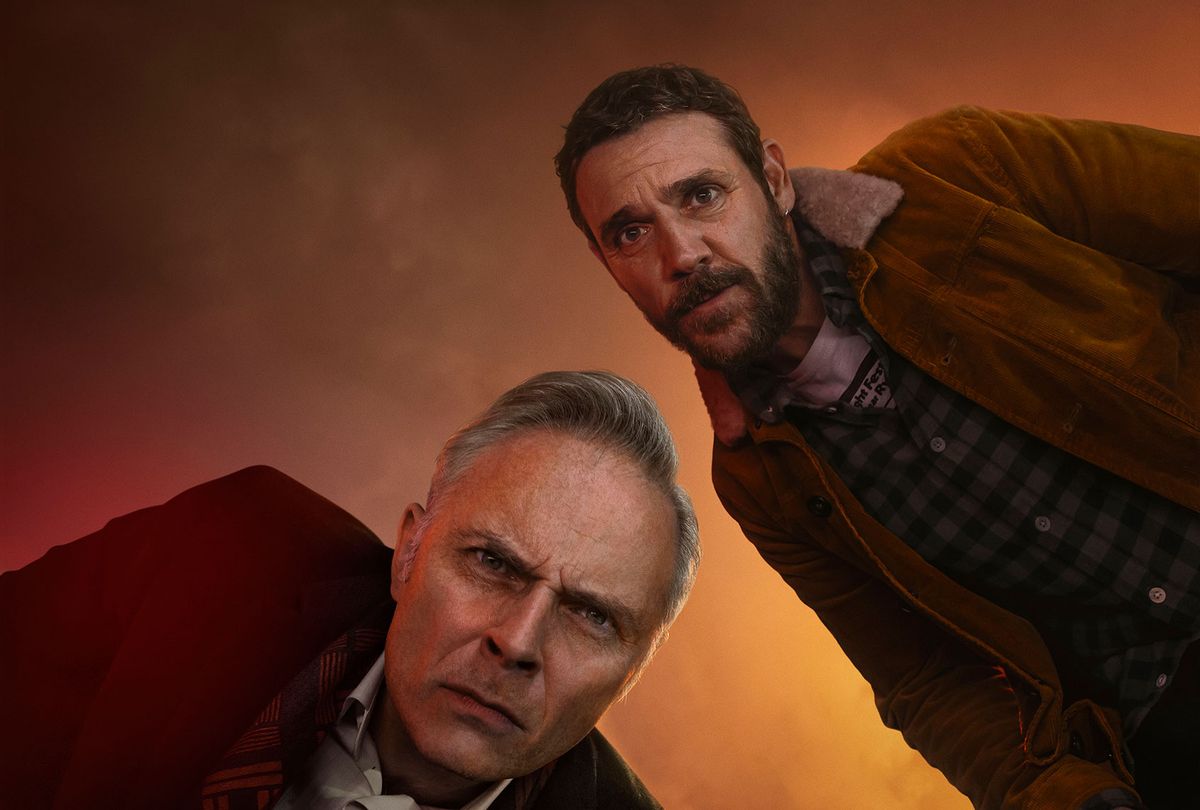"Let's go. They're fine . . . they're just wounded."
Turns out they are not fine. Or even wounded. In fact, they are dead. That's the reality bickering brothers Max and Jake McCall (Mark Bonnar, Jamie Sives) must face after accidentally running over an elderly man in "Guilt," a four-part Scottish series airing as part of PBS' "Masterpiece Mystery."
Jake is immediately overcome with horror and remorse, wanting to call the authorities. As a 40-something owner of record store Leith Beats, he's all about vinyl and vibes, not violence of any sort. His older brother Max, however, is a high-flying lawyer and understands how this could negatively impact his career. Not on his watch.
Instead, he convinces Jake to help cover up the crime by placing Walter Woods – that's the name of their hapless victim – back in his own living room propped up in an armchair. Upon finding paperwork revealing that Walter had terminal cancer, Max feels vindicated. Not only will it seem like the "poor bastard just slipped away," but in the long run, they may have even saved him some pain (other than the pain of getting mowed down by an automobile, that is).
It's the perfect crime, even if it wasn't premeditated.
"Guilt" writer and creator Neil Forsyth spoke to Salon about getting inside the head of someone like Max.
"A certain person sees the world so entirely through the prism of their own ambition and motivation that it's impossible for any form of situation to be seismic enough to shatter that structure they have," he said.
Want a daily wrap-up of all the news and commentary Salon has to offer? Subscribe to our morning newsletter, Crash Course.
"Guilt" explores the brothers' crime – all the lies and evasions to avoid being discovered, such as Jake cozying up to Walter's American niece Angie (Ruth Bradley). Through the course of the series, however, we soon learn that others around them aren't morally pristine either.
The sticking point, however, is how much the characters actually feel guilt, if any at all. Max isn't the only ruthless one. "It's such a subjective decision, what people feel guilt over, and how much guilt they carry, how long they carry it for," said Forsyth.
While the writer was inspired by "Fargo" and series like "Breaking Bad" when it came to the blend of crime and humor, "Guilt" isn't quite as bloody or dark.
"Some of the reviews say, you know, it has 'pitch black humor.' Not really. It's on BBC Two at nine o'clock," said Forsyth, referring to the series' not-so-gritty UK timeslot.
Instead, Forsyth feels that the humor – rather absurdist and understated – is specific to Scotland, especially the east coast. While the series is set and shot in Edinburgh, Forsyth himself grew up in the culturally rich Dundee.
"I hope Americans can understand the accent. Stick on the subtitles," he said. "I hope that I've managed to make it specific enough that it's a fun, different world for them to spend some time in it."
Check out the rest of the interview with Forsyth, who also discusses sibling dynamics, how to get away with murder and the Scottish obsession with American culture.
The following interview is lightly edited for length and clarity.
Could you walk me through developing the concept of the initial crime? How did you decide on how serious it would be but perhaps still an understandable accidental killing?
Neil Forsyth: I wanted to write something about brothers. I think the sibling relationship is dramatically very interesting. You can have two very different people who have this unshakable tie in history, but they have their own life . . . You don't have the domestic [aspect]. They can have a row and they don't have to have the awkward dinner afterwards. They don't have to go to bed together and work out if they're going to continue the row – that more kitchen sink drama route. You don't have any of that.
So I started off thinking about two brothers, who would be very different, who probably don't spend a lot of time together and probably have huge historical resentments. And for the first step of why would they have to be seeing each other again, I thought what if they're at a family wedding. And even with that they thought it'd be a sort of fairly superficial meet and greet with each other, but through the evening, events transpire that they're stuck driving home together. And then quite, almost immediately, I thought, well, they'd have to hit someone. And you know, you kind of kind of go from there, really.
So it was that initially, who they are and actually how awkward they would be together. And probably the last person they want to share that car journey home with from this stilted family gathering and then an event that traps them together for eternity.
I take it you have siblings?
Forsyth: [Laughs] I should be clear there's significant creative work that's gone into this story. I've got siblings, and it's just an interesting relationship. I think what's nice about siblings is the childhood structure of that relationship never really changes. And here, there's this preposterous situation that you have with the siblings in their 40s – as Max and Jake would be – where there's an age difference of a couple of years. When you're three and five, that's an eternity. That structure is set. So you have these two men who're virtually the same age, but that big brother, little brother thing is unshakable.
 Jamie Sives in "Guilt" (PBS/Expectation/Happy Tramp North)
Jamie Sives in "Guilt" (PBS/Expectation/Happy Tramp North)
Could you speak to the creation of the McCall brothers and their dynamic?
Forsyth: They're polar opposites certainly in how they see life, what they want from life. And, by what happens to them in the car. One feels no guilt at all. But it's more interesting than that. Because where does that come from? One feels guilt. But it's more interesting than that, because he almost feels too much guilt as if that makes any sense. It's like he's been waiting to have this thing happen to him so he can martyr himself and draw the clear lines between him and his brother.
And then with Max, it's why he has become so hardened to life and why he is so focused and self-involved and narcissistic and finding interesting reasons so that they become some way sympathetic. It's about muddying the waters, . . . And of course, the more time you spend with people, the more you particularly learn about their lives and their background and history. Everything starts to make sense and become a little less clear, if you like, morally in particular.
The two brothers in "Guilt" were initially written to be at least 10, 15 years younger than they appear onscreen. How did casting Mark Bonnar – who was in his late 40s when shooting this – and subsequently making the brothers older, affect the story?
Forsyth: It helps to be honest. I think it just felt they had a little bit more dramatic heft to them. When they talked about past pain, I think it feels weightier, when they're both late 40s, 50s, talking about something that happened in their childhood, than if they were a decade younger. Because here's another decade they've carried this thing with them for and that's just another decade that is bundled into the psyche and their relationship as well.
And one of the many things [Mark] does so well is the humor. It needs to feel like a natural reaction to the position the characters are in and the stresses that they're facing. And then Mark so brilliantly has this just throwaway dry, very naturalistic delivery, and it really helps.
Is that true that no toxicology test is done if the person has a terminal illness and looks like they just died of natural causes?
Forsyth: I can honestly tell you that the toxicology and the legal stuff around someone dying and being found in Scotland, and so on and so on is narratively bulletproof. We had endless, incredibly long conversations about it. I spoke to lawyers, and I spoke to doctors and everything else. It stands up, believe me, I can't even remember the ins and outs of it. They're conversations I remember with dread: two hours wading through minutiae of ambulance pick-up policy and so on. But no, it holds together I promise.
As heinous as the crime is, as an audience member I find myself to a certain degree rooting for them not to get caught, or at least not severely punished. This is a morally ambiguous place for us to be. Could you discuss finding that balance of putting the characters in these situations?
Forsyth: The biggest thing is just being confident enough to not paint a black and white story in any way in terms of storytelling or in terms of characterization. If it's in the gray, then people can make their own decisions. It makes the characters feel more nuanced and makes the characters more capable of surprise. No one's a baddie, no one's a goodie. Anyone can react in any way in a situation.
But I think definitely that's the exact reaction we're looking for of people saying, "Right, this is definitely really, really bad. But I sort of understand how they've got into this situation. And I sort of want them to get out of it."
 Ruth Bradley and Emun Elliott in "Guilt" (PBS/Expectation/Happy Tramp North)
Ruth Bradley and Emun Elliott in "Guilt" (PBS/Expectation/Happy Tramp North)
Why did you make Walter's niece Angie, be American? She could've been from anywhere. I think there was even mention of Australia.
Forsyth: I grew up in provincial city in Scotland called Dundee, and I was obsessed with American television. I remember watching "Roseanne," "Cheers," "The Wonder Years," "Happy Days." It was this huge Americana influence over over British television. I just remember sitting there watching "Roseanne" and thinking, "Oh, imagine living in Illinois." Any American context was wildly exciting, and I've probably never really shaken that off.
But also that's quite a Scottish thing. You know, there is this strain of Scottish-ness, which is very outward looking and romanticizing. And I think that I just felt that Jake would find Angie being American impossibly exotic and exciting. And then her and him having a love of the same American music in that connection I thought be really nice as well.
I'm a huge fan of all the American influence of music that we talked about in the show we have in the show. And so I wanted to write about that and wanting to get Rick Danko into BBC Scotland drama scripts. So it came from myself, and then it felt natural through the characters.
Because of their bonding over vinyl, the conversations about music were fairly surprising to me. Lots of names dropped.
Forsyth: Yeah, the record shop stuff was went a lot deeper than I expected it to, you know, just to keep getting more and more specific and see if anyone was gonna ask me to stop. But they were all fine with it.
I guess that's fine to do as long as you don't actually play the music much because that's expensive to get the rights to . . .
Forsyth: No, exactly. We already kind of blew most of our budget on Van Morrison's cover of Bob Dylan's "It's All Over Now, Baby Blue," which is incredible. We managed to get that for the end of Episode 2 through a weird connection to Bob Dylan's manager, we managed to get it for a fraction of what it would have cost us otherwise. But that was very exciting for me as well as I'm a huge Bob Dylan fan.
In another interview, I saw that you had initially written this hoping to sell the series in America. But ultimately this was made for BBC Scotland – its first original drama series – and BBC Two. What did that add, for the show to be able to shoot it in in Scotland?
Forsyth: I'm incredibly glad I didn't sell in America. What would have happened would be what's happened with all my pilot script commissions in America, which is that I kill myself writing them, and they sink without a trace. From my experiences, I think I've sold half a dozen pilot scripts over there and they just go into the big vat and they don't come out. . . .
So it was one of the best best things ever for me in my career, that I failed to sell that pitch in America. Because I came back and I made it here but I made it in a way that was so much more personal to me and so much more relevant. It was far better show as a result. These are voices and characters that I just understand, they know parts of me and then parts of other people but I just know the Scottish vernacular and or the Scottish outlook. To me east coast Scots is quite a specific cultural outlook; I think it's a bit more absurdist than the Glasgow kind of humor and vocabulary. The east coast of Scotland is a slightly different place, and certainly Dundee where I'm from there's this huge tradition of kind of absurdist comedy.
"Guilt" airs its first two episodes on Sunday, Sept. 5 at 9 p.m. on PBS, and the final two episodes on Sunday, Sept. 12.



Shares